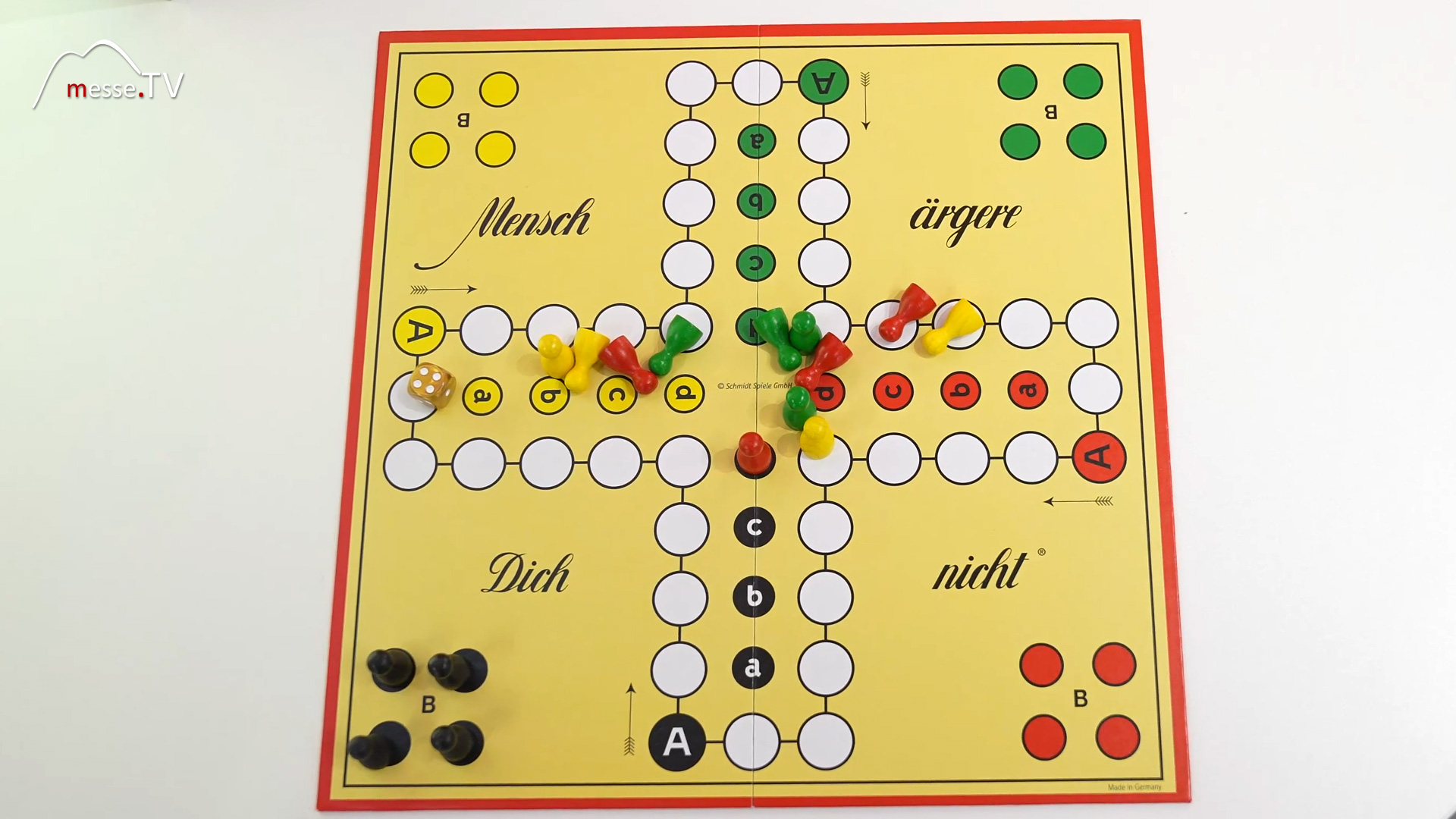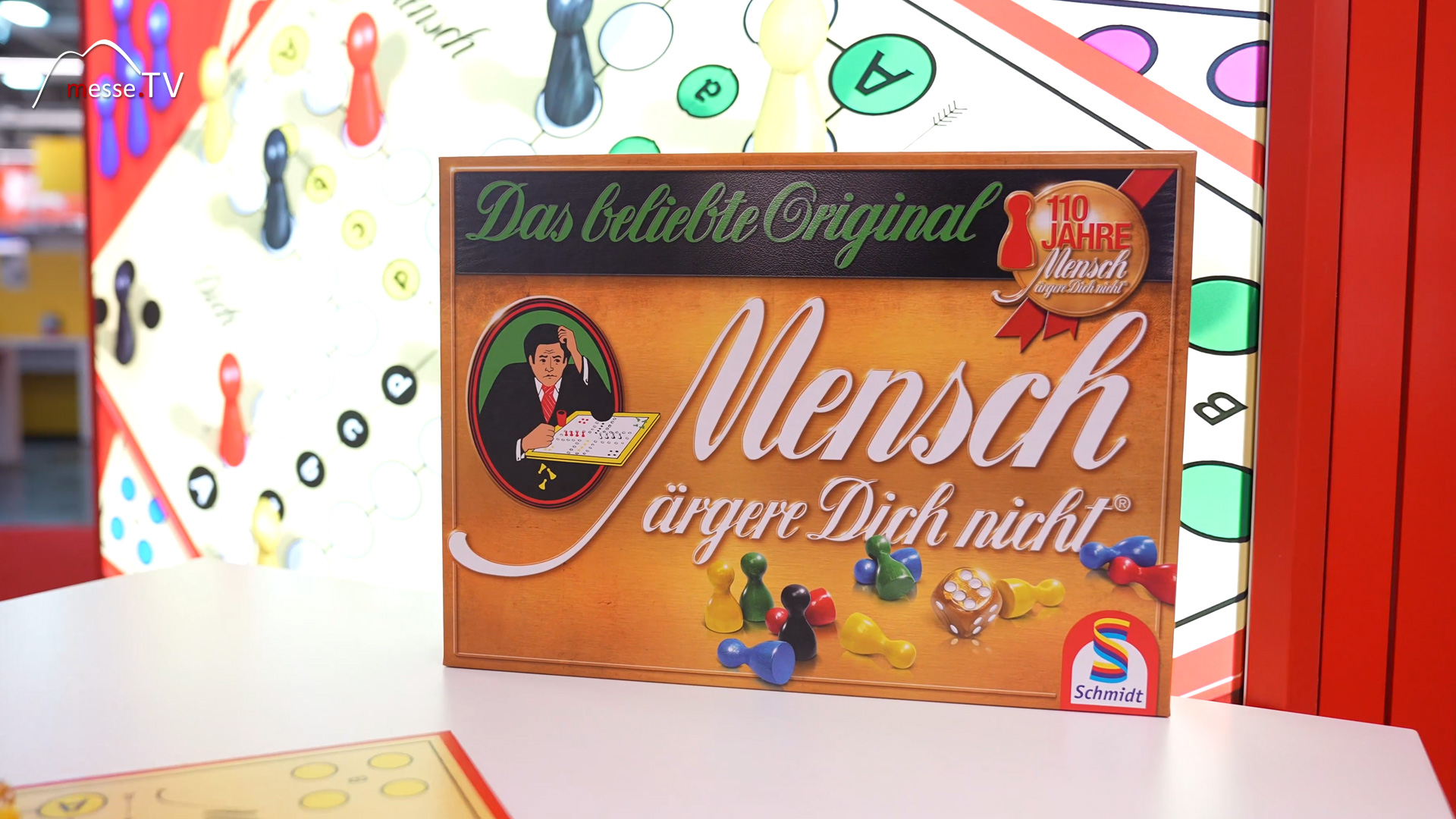"Mensch ärgere Dich nicht" is 110 years old. Who doesn't know it? The popular board game in which players have to move their pieces from the starting square to the finish line. While trying to get their own pieces to the finish line, they also have to block or throw out the other players' pieces. The mixture of excitement, communication and interaction makes it an entertaining classic for the whole family. Marie-Luise Marjan, better known as "Mutter Beimer" from Lindenstraße, is also an enthusiastic fan of this classic game. As a star guest of Schmidt Spiele, she talks to Messe.TV about her experiences with "Mensch ärgere Dich nicht" in her own family.
Mensch ärgere Dich nicht - who doesn't know it? The classic board game par excellence that has been in almost every household for over a century. The name of the popular board game alone describes almost perfectly what awaits up to four players in a game: Mensch, ärgere dich nicht! Frustration, joy, despair and, in the end, lots of fun are guaranteed in every game. The history of the original game, which was still sold in a very compact form in the first half of the 20th century, is particularly interesting. Barely larger than a small paperback book, the original game fitted into almost any pocket and could be easily transported from A to B. Although there are still a few compact mini versions of "Mensch ärgere Dich nicht" today, the popular board game has become increasingly larger over time.
The idea for the game came from the inventor Josef Friedrich Schmidt, who was looking for something for his three sons to do one cold winter in 1907. His creativity and ingenuity led him to create a running game from nothing more than the cardboard of a small hat box. He gave this game the name "Mensch ärgere Dich nicht". Even Josef Friedrich Schmidt could not have imagined what was to be created from the cardboard of a small hat box in the winter of 1907. Today, "Mensch ärgere Dich nicht" is one of the most popular social and board games and the fascination of the game extends far beyond the borders of Germany.
The advantages of the game are as varied as the course that each individual game can take. First and foremost, the simplicity of the game principle should be emphasized. It requires neither tactical considerations nor accessories. Whether big or small, everyone understands the game principle straight away. This makes "Mensch ärgere Dich nicht" suitable for both young and old and can provide hours of entertainment. For this very reason, almost all of us have memories of the game, be it from our childhood, when we were finally able to bowl our father out of the game and were incredibly happy, or from the present day, when playing with our best friends. In fact, "Mensch ärgere Dich nicht" even has a therapeutic effect, as it stimulates communication with one another, can strengthen family togetherness and ensures that even old or sick people can still take part in a great parlor game.
If you take a look at the developments that have taken place in the toy industry over the last few decades, things are no longer the way they used to be. Everything has become more modern and while classic games such as "Mensch ärgere Dich nicht" were self-contained and therefore timeless board games, many games today are based on current trends from film and television. This is intended to arouse the interest of young people. However, this also ensures that the games quickly lose their relevance, seem reproducible and as soon as a certain trend from film and television has passed, the games disappear completely from the scene. This was very different in the past, as can be seen from the history of "Mensch ärgere Dich nicht". Toys used to be made from the simplest things, such as dolls, figures or board games. This not only created a much stronger bond with the toys, but also automatically made people appreciate them more. Uniqueness, individuality and character are all elements that once characterized toys. "Mensch ärgere Dich nicht" is one of the best examples of this.


These are just some of the many reasons why this classic board game has survived for more than a century and why its popularity has never really waned. But of course, "Mensch ärgere Dich nicht" is also subject to the ravages of time to a certain extent and cannot completely escape the modern world with all its changes. Although the classic game has remained faithful to its game principle and nothing will change in the centuries to come, there have always been small adjustments, especially in terms of appearance, packaging and game design. After all, the aim is to appeal to young people of every generation and get them excited about this great game, which has always worked well with a slightly more modern design.